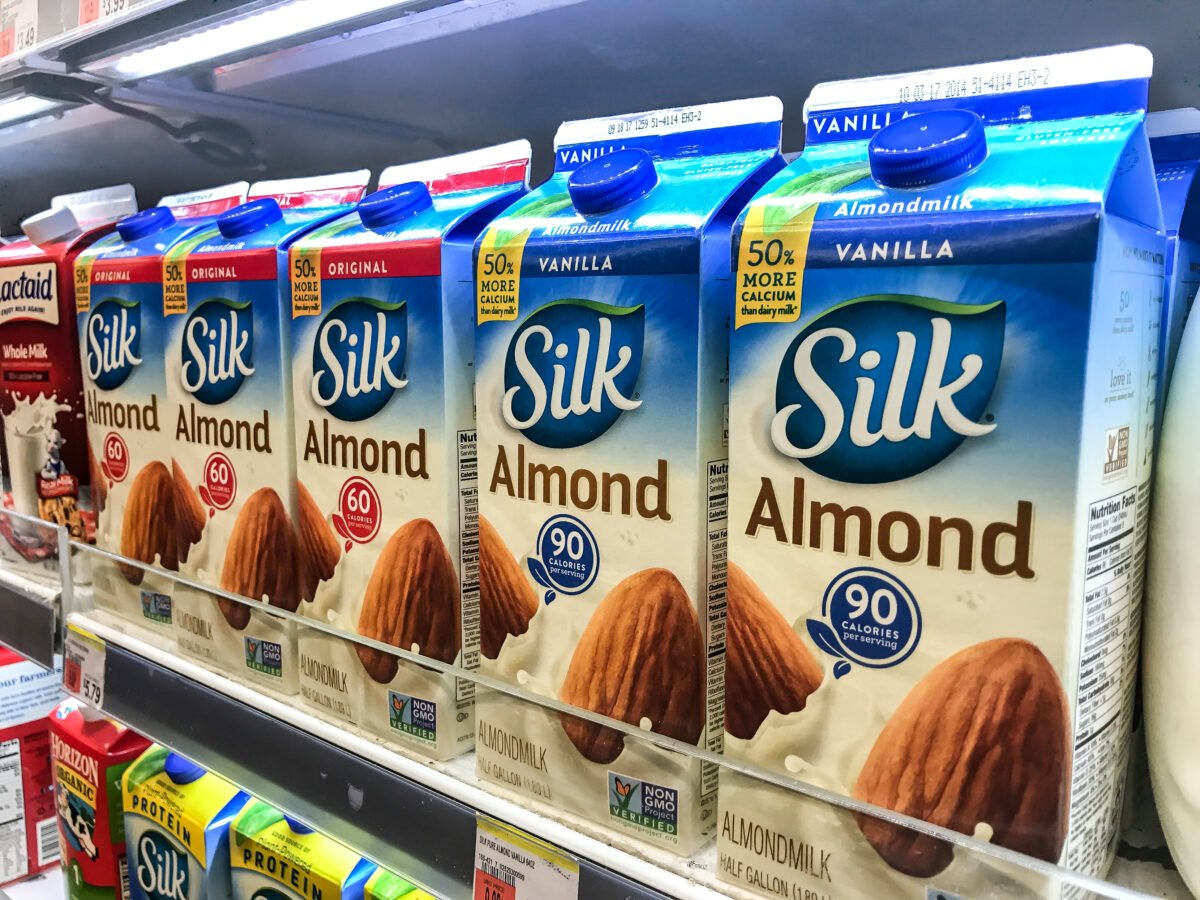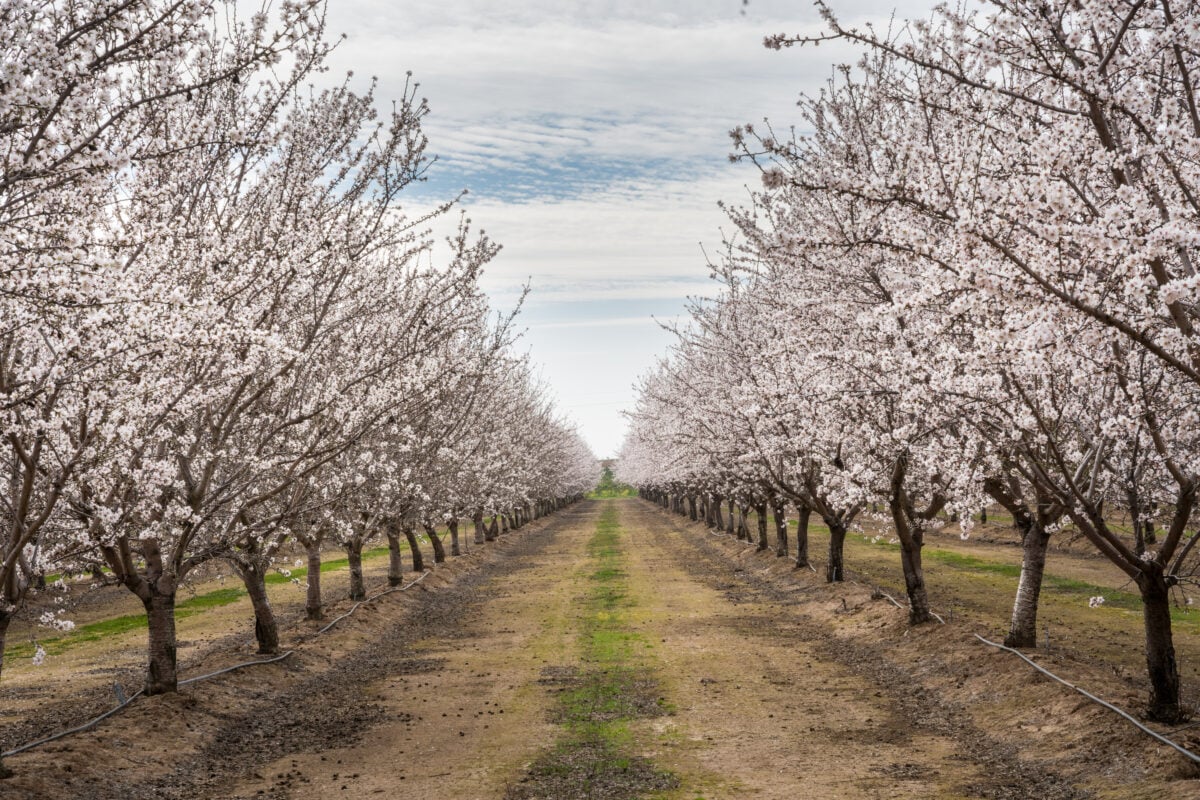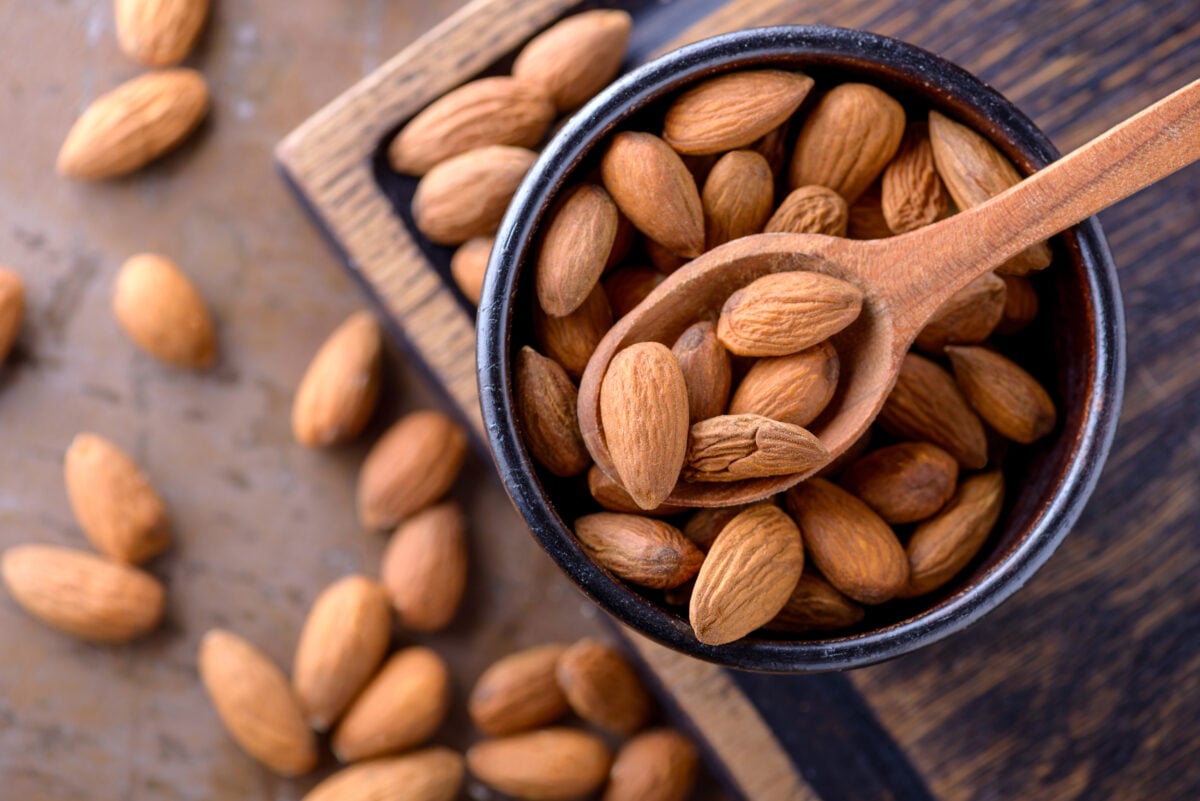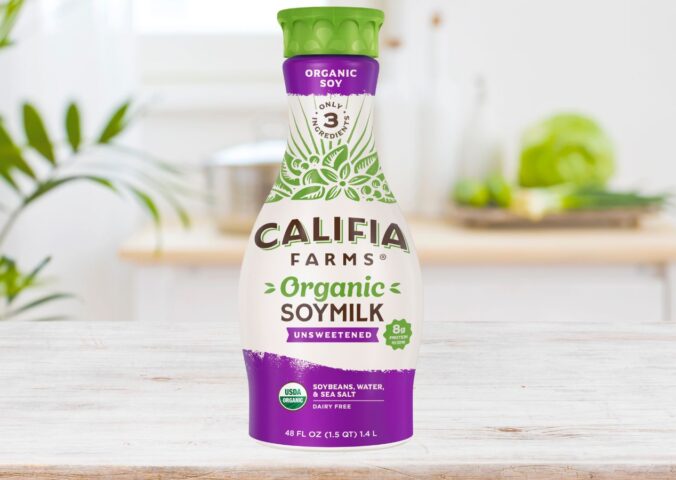Over the last few years, there has been growing awareness of the huge impact our diet has on the environment. Study after study has shown that meat and dairy is destroying the planet, and the science is clear that we must move towards a more plant-based food system to avoid climate collapse. But despite this, society often chooses to ignore the impact of animal foods, and focus instead on demonizing vegan foods. One of its favorite targets? Almonds.
Read more: ‘Transfarmation’ Stories: The Farmers Switching From Animals To Crops
The furore against almonds can be largely traced back to the exploding popularity of almond milk, which took place in the 2010s. As more and more people went plant-based and became vocal about our food system’s problems, the media and popular culture fought back, deciding to blame vegans for eating almonds, rather than themselves for eating dairy.
Piers Morgan regularly labels vegans “hypocrites” for eating almonds on his show. Publications often cite almonds in articles claiming that vegans are destroying the planet. A daytime show called This Morning once warned viewers not to drink almond milk if they had an “environmental conscience.” In the hugely popular TV sitcom The Good Place, a running joke throughout the series is that Chidi ended up in hell because he enjoyed almond milk on his coffee, despite knowing its “environmental impact.”
But why are almonds so notorious? And do they really deserve this reputation? Here, we delve into everything you need to know about the ethics of eating almonds.
The popularity of almond milk

Variations of almond milk have been around in some cultures for hundreds of years, but its popularity as a plant-based milk alternative started in the 21st century. Around a decade ago, in 2014, almond milk hit headlines when it overtook soy as the USA’s favorite plant milk. It maintains this title today, with soy and oat milk following behind. In just three months in 2021, almond milk sales reached USD $344 million. The global almond milk market is worth around $5.46 billion.
Almond milk is essentially a blend of almonds and water, and many brands add sweeteners or sugar, as well as fortifications of vitamins and minerals. Almond milk is popular in coffee, breakfast cereal, and a wide range of plant-based recipes. It’s now available at pretty much any cafe, supermarket, or restaurant you go to.
Read more: Will Eating Chicken Really Save The Planet?
The environmental cost of almonds
The main reason why almonds are controversial is because they use up a lot of fresh water. Around 80 percent of the world’s almonds are grown in California, a state that regularly experiences droughts. Between the years of 2012 and 2016, a time when almond milk was first becoming mainstream, California experienced its worst droughts on record. Blaming almonds for these droughts has therefore been easy, convenient, and commonplace.
And, to an extent, almonds do deserve this blame. Tree nuts need a huge amount of freshwater to grow, and almond farming uses up nine percent of California’s freshwater. This is a substantial amount, and the fact that almonds have become more popular over the years has worsened the problem. Due to growing demand, growers have started planting almond trees in hot and dry regions, such as the western San Joaquin Valley, where water supplies are fragile. This means that a huge, and growing, amount of groundwater is being irrigated to keep these trees healthy in difficult conditions.
There is no doubt that almonds are using up water, and people are right to label them as not environmentally-friendly in that regard. The mistake society makes, however, is believing them to be worse than dairy.
Almonds VS dairy

The vast majority of media reports, segments, and popular culture moments that attack almond milk for its water usage fail to give any mention to the huge water use of dairy.
While nine percent of California’s agricultural water is used for almonds, around 16 percent is used to grow a crop called alfalfa, which is predominantly grown to feed dairy cows, as well as other farmed animals. A Food and Water Watch report published in 2023 found that dairy farming alone uses 142 million gallons per day. A study published in the journal Nature in 2020 reported that beef and dairy production is “the leading driver” of water scarcity in Western USA. A University of Oxford study published in 2022 found that dairy milk uses 628 liters of water per liter of milk, while almond milk uses 371 liters.
When assessing the environmental impact of a food, it’s not just water use that should be taken into account. The amount of greenhouse gas emissions, pollution, and land use the food contributes to, are all key indicators of how eco-friendly it is. In regards to these three categories, almond milk actually fares quite well.
According to the Oxford study, almond milk produces the lowest emissions of all plant milks cited, at 0.7 kg per liter. Oat milk produces 0.9 kg, soy milk 0.98 kg, while rice milk emits 1.18 kg. Dairy milk is by far the biggest contributor to greenhouse gasses, producing 3.15 kg per liter.
Almond milk also uses far less land than dairy at 0.5 square meters per liter, opposed to dairy’s 8.95 square meters. It’s worth noting that almond farming uses trees, which help remove carbon from the atmosphere, meaning its use of land is considerably more environmentally friendly than dairy’s. In terms of eutrophication (the pollution of ecosystems with excess nutrients), almond milk is the second least harmful of all milks studied.
Almond milk and bees
Another highly publicized issue with almonds is that they use bees in their production, as almond trees require cross pollination to grow.
Migratory beekeeping refers to the practice of transporting hives of bees long distances so they can help pollinate certain crops. Beekeepers often make a significant amount of their income by renting out their honey bees for this purpose. Bees are sentient beings, and making them travel in this way is likely highly stressful for them. Many die on route, and huge numbers are also killed on farms.
According to a 2020 report by the Guardian, beekeepers renting bees to almond farms were seeing bees die in “record numbers.” High mortality is attributed to pesticide exposure, diseases from parasites, and habitat loss. Using honey bees to pollinate crops also wreaks havoc on native bee populations, as they compete against them for food and resources. They may also spread diseases to other bees.
There is no doubt that migratory beekeeping is exploitative, and some people have claimed that foods like almonds (as well as avocados, cherries, kiwis, melons, and butternut squash) are not vegan because they are grown as a result of it.
Are almonds vegan?

The assessment that almonds are not vegan because of migratory beekeeping is not true. Almonds, along with avocados and other vegetables, are suitable for vegans. The definition of veganism, as outlined by The Vegan Society, is about avoiding animal use and exploitation “where possible and practicable.” It would be both impossible and impractical to avoid all indirect harm to animals while living in a non-vegan world. Veganism is about minimizing harm, rather than avoiding it altogether.
That said, that doesn’t mean that vegans support migratory beekeeping. Many strive to buy products that come from farms who do not rely on it, and vegans also fight for a plant-based food system where crops are farmed more naturally, and migratory beekeeping is not viable or needed.
If you are using the bee exploitation argument as a reason to consume dairy over almonds, it’s worth remembering that migratory beekeeping is also used to grow alfalfa and other crops fed to farmed animals, meaning dairy consumption contributes to bee exploitation too. Animal farming is also the leading cause of biodiversity loss, which is having a significant effect on bee populations.
Drinking cow’s milk directly supports an industry that breeds, raises, and exploits 270 million sentient beings globally. Cows, like all mammals, must give birth to a baby in order to produce milk, and they are forcibly impregnated around once a year to that end. After they give birth, their baby will be taken from them after just a few hours. If the baby is female, she will likely suffer the same fate as her mother. If the baby is male, he will either be shot or sold to the veal industry. Illnesses like mastitis (a painful udder inflammation) and lameness are common on dairy farms due to the conditions in which the animals are kept. Dairy cows will therefore often spend their entire lives in pain. Once their milk dries up, they will be sent to the slaughterhouse.
The bottom line
There is no doubt that almonds are more water intensive than many other plant foods, and they are far from an environmentally-friendly food. Almond farming also causes harm to animals, contributing to exploitation and death of bees.
To some, therefore, almonds and almond milk are unethical foods, and should be avoided. This is a reasonable assessment to make, and it is absolutely right that almonds may not be compatible with some people’s lifestyle choices. If you are concerned about almonds but consume meat and dairy, however, it’s very likely that your issues with almonds are eclipsed by the products you are eating.
Over the last few years, almonds have gained a reputation that they don’t entirely deserve. Our society gives huge emphasis to the environmental and ethical costs of almonds and other plant foods, while largely sidelining or ignoring the significant costs of animal foods. This is misleading, and it gives the entirely false impression that almond milk is worse for the environment than dairy. Time and time again, however, almonds – and other plant foods – have been shown to be more environmentally-friendly, and more ethical generally, than animal products.
Read more: ‘Veganism Is Dead’: Say Media Outlets – Does The Data Agree?






